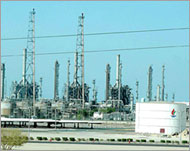Crude oil hits record high
Crude oil prices has hit a record $68 a barrel after the United States reported a decline in petrol stocks and China said its crude imports spiked in July, as the country’s thirst for oil shows no signs of easing.

Storms brewing close to Gulf of Mexico production facilities and fears that it could hurt output also contributed to the upward march, while in Tokyo, the Finance Ministry said crude imports for July stayed flat on year – but cost nearly 50%more.
Front-month October contracts on the New York Mercantile Exchange touched US$68 a barrel mid-morning in Singapore before easing slightly to US$67.55, a gain of 23 cents from Wednesday’s closing in New York.
China figures
The sharp spike in early Asian trade also came after China released data showing that its crude imports were up 15% on year in July, when benchmark Nymex crude hit US$60 for the first time.
Petroleum data from Beijing on Thursday showed China imported 11.1 million metric tons of crude oil in July, or an average of 2.62 million barrels a day, the General Administration of Customs said.
 |
|
China’s appetite for crude oil is |
In the first seven months of this year, China’s crude oil imports have risen 5.4% on year. The mainland’s growing appetite for crude is said to be one of the key reasons for the world’s shrinking excess capacity to offset any lost output.
The United States and China are the world’s top two consumers of crude.
In Tokyo, Japan said its crude imports, while only rising 0.8% on year in July, cost 48.5% more, another reflection of lofty prices.
‘Question is when’
Oil is nearly 50% higher compared to a year ago but on an inflation-adjusted basis, would need to hit about US$90 a barrel to match the highs of 25 years ago.
 |
|
The price is likely to rise as the |
“The market sentiment is not whether crude will one day reach US$70, the question is when,” said Victor Shum, energy analyst at Texas-headquartered consultants Purvin & Gertz in Singapore. “We are now heading into the fourth quarter, a seasonally higher demand period.”
With the summer driving season drawing to an end in the United States, market focus is expected to shift to heating oil and natural gas as demand for this product usually peaks in the winter.
On Wednesday, the US Energy Department said domestic inventories of petrol fell by 3.2 million barrels last week to 194.9 million barrels, or 7% below last year’s levels.
Nymex
US supplies of crude oil grew by 1.8 million barrels to 322.9 million barrels, or 13% above year ago levels, the agency said. The supply of distillate fuel, which includes heating oil and diesel, increased by 1.4 million barrels to 132.5 million barrels, or 4% above last year’s level.
The draw in gasoline stocks was the eighth consecutive week of falls, primarily from high demand.
|
“The market sentiment is not whether crude will one day reach US$70, the question is when” Victor Shum, Purvin & Gertz analyst |
The snapshot did little to calm markets, instead sending Nymex crude to a new closing high of US$67.32 a barrel.
In other Nymex prices Thursday, September contracts for heating oil rose more than a cent to US$1.8775 a gallon, petrol was up 3 cents to US$1.9575 a gallon while natural gas eased nearly 13 cents to US$9.855 per 1,000 cubic feet.
Stoking bullish sentiment was Tropical Storm Katrina – expected to reach the Gulf of Mexico and its facilities by the weekend. Gulf production accounts for around 30% of US output and refineries have shut down as a precautionary measure against hurricanes.
Storms
Some analysts however, believe such fears are overemphasized because jittery traders latch onto any news with an upside bias.
“As with most storms, we think the fear factor is exceeding the likely impact on production here,” said Timothy Evans, senior energy analyst at IFR Energy Services in New York.
Markets were shaken recently by production outages in Ecuador, due to worker unrest, and in Iraq, where fighters shut down most of the country’s electricity grid on Monday. Production in both countries have since stabilized.
Also Thursday, International Monetary Fund managing director Rodrigo Rato warned high oil posed a significant risk to global economic expansion, and said prices were not likely to fall in the near term.
“There is not much cushion in refinery capacity and crude capacity. The question is when will demand be destroyed as a result of these high prices?” said Shum, the Purvin & Gertz analyst.